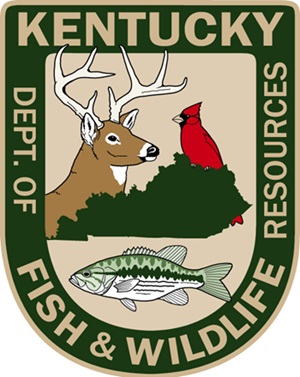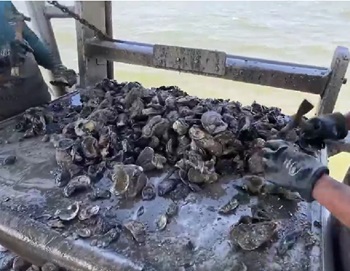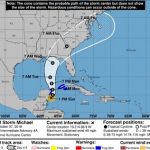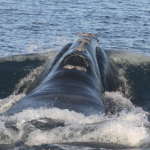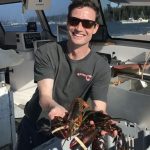Tag Archives: U.S. Fish and Wildlife Service
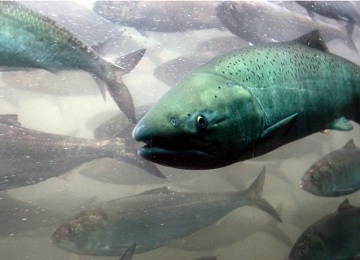
What Happened to California’s Salmon Season This Year?
This spring, fisheries’ managers closed the commercial and recreational salmon season off the coast of California, owing to cratering fish populations, for the first time since 2009. Every one of the few fish left from the generation of Chinook salmon currently swimming in the ocean are needed to return to their natal streams and spawn, managers decided. On the Capitol steps, Bates, Jackson-Reed and other tribal leaders and environmental activists charged that officials, and the Newsom administration in particular, are failing the people and species that benefit from the Sacramento River system by appeasing wealthy farms and other big water users. >click to read< 10:31
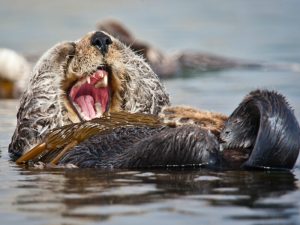
U.S. Fish and Wildlife Service Strategy to Reintroduce Sea Otters is Flawed
The USFWS study fails to estimate costs to taxpayers; impacts to key local fisheries such as Dungeness crab and sea urchin; neglects to fully examine the impacts to local port and harbor activities and fishing communities and fails to directly clarify to impacted Tribal Nations that no ceremonial and subsistence uses – or control of otter populations negatively impacting other important Tribal resources – are permitted under current Federal law. For Oregon and California coastal communities dependent on Dungeness crab, sea urchin, and other shellfish, reintroducing sea otters in an area where they have been absent for more than 100 years will spell big trouble. Yet, a recent report from the U.S. Fish and Wildlife Service (USFWS) concludes it is “feasible” to reintroduce them to Southern Oregon and Northern California. >click to read, with links< 08:19
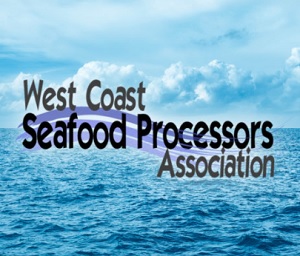
Seafood Industry Professions Raise Concerns About Reintroduction Of Sea Otters
West Coast Seafood processors says that their membership is concerned about a study on the impacts of sea otters on coastal fishing. The West Coast Seafood Processors Association says that they join other ocean stakeholders in a lack of confidence about concerns raised about the otters. “We remain very concerned that the issues we identified in our letter last year will not be adequately addressed in the Fish and Wildlife Service’s cost and feasibility study,” West Coast Seafood Processors Association Executive Director Lori Steele said. >click to read< 18:24
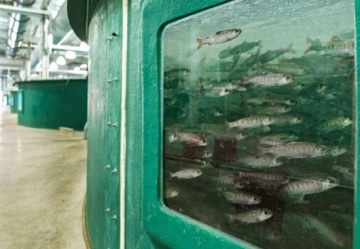
The U.S. Has Spent More Than $2 Billion on a Plan to Save Salmon – The Fish Are Vanishing Anyway.
The Carson National Fish Hatchery was among the first hatcheries funded by Congress over 80 years ago to be part of the salvation of salmon, facilities created specifically to replace the vast numbers of wild salmon killed by the building of dozens of hydroelectric dams along the Northwest’s mightiest river, the Columbia. Tucked beside a river in the woods about 60 miles northeast of Portland, Carson has 50 tanks and ponds surrounded by chain-link fencing. They sit among wood-frame fish nursery buildings and a half-dozen cottages built for hatchery workers in the 1930s. Today, there are hundreds of hatcheries in the Northwest run by federal, state and tribal governments, employing thousands and welcoming the community with visitor centers and gift shops. The fish they send to the Pacific Ocean have allowed restaurants and grocery seafood counters to offer “wild-caught” Chinook salmon even as the fish became endangered. photos, >click to read< 16:58
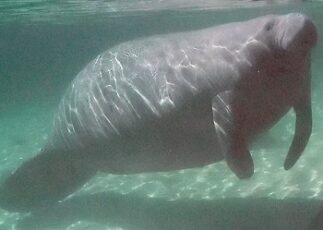
More Florida manatees died in 2021 compared to any other year
There have more manatee deaths so far this year in Florida compared to any other year in the state’s recorded history. The Florida Fish and Wildlife Conservation Commission reports 841 manatees have died through July 2, topping the previous record of 830 deaths that were recorded in all of 2013. That occurred following a red tide outbreak,,, This year, the FWC says, there has been “unprecedented manatee mortality due to starvation.” video, >click to read< 15;04
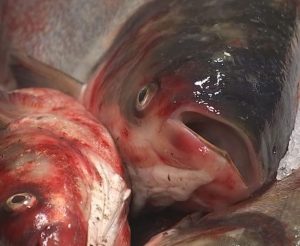
Inland Fish Fight: Invasive Asian carp threaten Kansas and Missouri waterways
Common carp, which resemble overgrown goldfish, were imported from Europe, where they were popular sportfish and table fare over 150 years ago. But bighead and silver carp were first brought from Asia about 50 years ago, Chapman said. Being plankton eaters, the carp were imported with the hope they could clean waters of unwanted materials, including sewage lagoons. It didn’t work out that way. “There’s never been a fish brought in for large-scale aquaculture that hasn’t escaped into the wild,” Chapman said. “Somebody wasn’t paying attention.” >click to read< 10:47
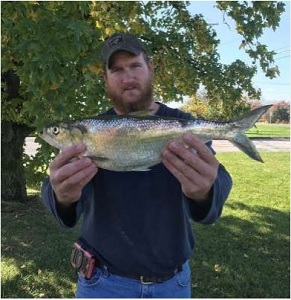
Herring in Missouri? Hell Ya! Angler ties state record with 3-pound fish
Bryant Rackers is in the Missouri fish record book — again. Rackers, of Bonnots Mill, caught a 3-pound skipjack herring on the Osage River on Oct. 27, a fish that tied the current Missouri record for skipjack herring. According to the U.S. Fish and Wildlife Service, people do eat skipjack herring, “but they are generally considered a ‘rough fish’ because they are difficult to debone.’ “These fish are caught by commercial fisherman,,, >click to read< 13:06
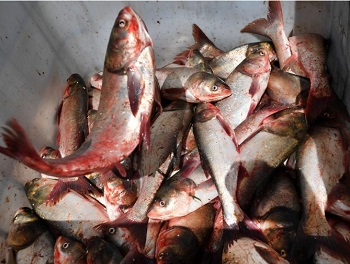
U.S. Senate’s proposed $14 million funding increase to fight Asian carp not matched in House budget
Last month, the Senate Committee on Appropriations approved a funding bill that included $25 million for Asian carp management, a $14 million increase from last year. That money would go to the U.S. Fish and Wildlife Service to be divided nationally for areas dealing with the fish. At the time, U.S. Sen. Lamar Alexander, R-Tenn., was hopeful the bill would give areas including Tennessee more resources to deal with the threat.,, The funding increase would be used to expand a block and tackle plan. The plan includes installing sound barriers that would keep carp from traveling through dams and then paying commercial fishermen to harvest the fish. >click to read< 19:26
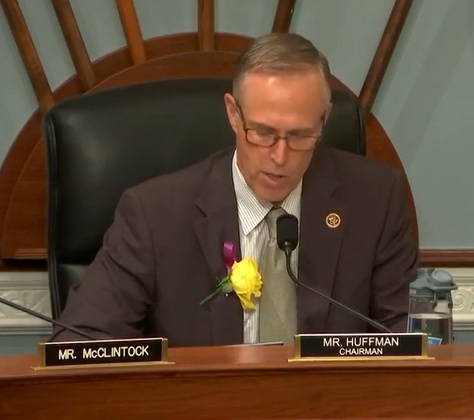
NOAA admin defends budget in House oversight hearing
The House Subcommittee on Water, Oceans and Wildlife met to discuss the administration’s fiscal year 2020 budgets for the National Oceanic and Atmospheric Administration and the U.S. Fish and Wildlife Service. The California Democrat (Huffman) said the Trump administration’s proposed budget shows the president “does not value oceans, wildlife or the communities that depend on healthy ecosystems.” (rolls eyes) McClintock, R-Calif., indeed did say the proposed cuts in the budget were not only the proper way to go, but should go further in consolidating perceived overlaps between NOAA and USFWS and cutting away more spending programs. >Video, starts @17:45 click to read<10:09
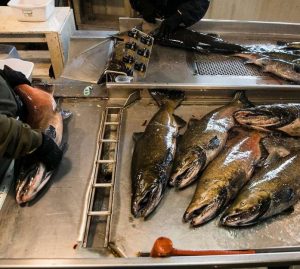
Salmon surge: Habitat improvements paying off on one California river
Near record numbers of chinook salmon are surging up the Mokelumne River, marking the second large spawning year in a row and signaling to fisheries biologists that habitat improvements in recent years are paying off for fish and the people who eat the pinkish delicacies.,,,It is expected to be the best two-year run on the river since records started being kept in 1940, a significant accomplishment given how dismal salmon returns have been over the past three years in virtually every other waterway in California, including the Sacramento River, which last year saw its lowest returns in eight years. >click to read<08:58

Senators question NOAA Fisheries-FWS merger proposal in hearing
Members of the U.S. Senate got their first chance to look at the latest attempt to merge NOAA Fisheries with the Fish and Wildlife Service at a meeting on Thursday, 19 July. ,,,“Moving NOAA Fisheries from (the Department of) Commerce to the Department of Interior ignores the agency’s responsibility of managing multi-billion-dollar commercial fisheries,” said Cantwell, who added that she believes what fisheries need is “science and funding.” A merger of the two agencies requires approval of the U.S. Congress. >click to read<17:11
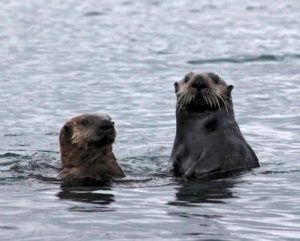
Alaska Dive Fishermen Plead for Relief from Sea Otters
Phil Doherty, head of the Southeast Alaska Regional Dive Fisheries Association, is working to save the livelihood of 200 southeast Alaska fishermen and a $10 million industry but faces an uphill struggle against an opponent that looks like a cuddly plush toy. Fishermen have watched their harvest shrink as sea otters spread and colonize, Doherty said. Divers once annually harvested 6 million pounds (2.7 million kilograms) of red sea urchins. The recent quota has been less than 1 million pounds (454,000 kilograms). “We’ve seen a multimillion-dollar fishery in sea urchins pretty much go away,” he said. >click to read<12:46

Maine Men Sentenced for Illegally Trafficking American Eels
Today, William Sheldon was sentenced in federal district court in Portland, Maine, to six months in prison followed by three years supervised release for trafficking juvenile American eels, also called “elvers” or “glass eels,” in violation of the Lacey Act,, Sheldon was also ordered to pay a fine of $10,000, forfeit $33,200 in lieu of a truck he used during the crime, and may not possess a license to purchase or export elvers as a special condition of his supervised release. Also sentenced today for elver trafficking offenses was Timothy Lewis, who received a sentence of six months in prison followed by three years supervised release, with the special condition that he too may not possess a license to purchase or export elvers. Lewis was also ordered to pay a $2500 fine. Thomas Reno was also sentenced today to one year probation. >click to read<08:57

Alaska Senate passes Stedman’s sea otter resolution
The Alaska Senate passed a resolution Wednesday calling on the federal government to take steps to increase the harvest of sea otters in Southeast Alaska. Senate Joint Resolution 13 is sponsored by Sitka Republican senator Bert Stedman. It asks the federal government to transfer management responsibility to the state government or National Marine Fisheries Service, instead of the U.S. Fish and Wildlife Service. It also urges federal agencies to work with the state and other interest groups to produce a management plan for otters, recognizing their impact on crab, clams, urchins and other sea creatures. >click to read<11:07
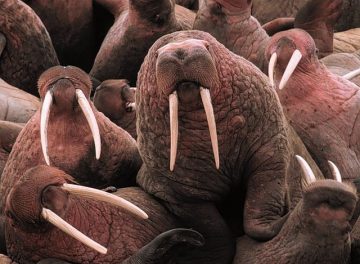
Feds Sued to Force Protection of Alaska’s Pacific Walrus
The Center for Biological Diversity sued the Trump administration Thursday over its denial of Endangered Species Act protection to the Pacific walrus. The lawsuit, filed in Anchorage federal court, challenges the October 2017 decision by the U.S. Fish and Wildlife Service finding the Pacific walrus does not warrant listing as a threatened or endangered under the Endangered Species Act. “The service’s listing decision deprives the walrus of the ESA protections which it is both entitled to and desperately needs,” the complaint states. >click to read<15:30
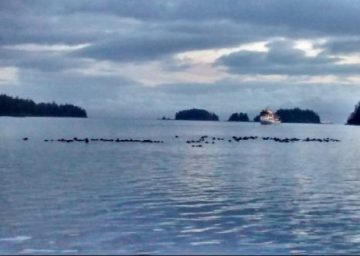
Stedman sponsors resolution to control sea otter growth
A Senate resolution seeking an increase in the number of sea otters hunted in Southeast Alaska is making its way through the legislative process. Sitka Republican Sen. Bert Stedman said the Senate Joint Resolution 13 is a way for the state to ask the federal government to do something about Southeast’s increasing otter population. “I think this is a good starting point for the conversation,” he said. “We live a different lifestyle up here, and we want to preserve it and keep it in balance. And having the sea otters virtually run unchecked,,, >click to read<19:30
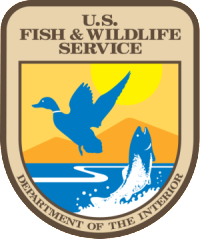
Fish and Wildlife Service official reportedly violated conflict of interest rules
Richard Ruggiero, chief of the Division of International Conservation at the U.S. Fish and Wildlife Service, may have violated federal ethics rules by his involvement in agency grants that provided monetary benefit to a family member, according to a Feb. 20, 2018, Department of Interior Inspector General report. “We found that Ruggiero violated federal laws and regulations by participating in an FWS cooperative agreement that financially benefited his family member, and neither Ruggiero nor his family member disclosed their relationship in writing to the FWS,” the report said. >click to read< 17:22

H.R. 2504 – House approves Poliquin’s proposal for swifter exports of Maine seafood
The U.S. House of Representatives on Monday passed a bipartisan bill introduced by U.S. Rep. Bruce Poliquin (R-ME) that aims to limit mandatory inspections and hasten exports of specific types of Maine seafood. H.R. 2504 would ensure fair treatment in licensing requirements for the export of certain echinoderms, namely sea urchins and sea cucumbers, a highly perishable product threatened by spoilage due to regulatory red tape around inspections, according to Poliquin’s office.>click to read< 19:21

Maine Harvester Enters Guilty Plea, Maine Dealers Sentenced for Illegally Trafficking American Eels
Yarann Im was sentenced to six months imprisonment and three years of supervised release and Thomas Choi was sentenced to six months in prison with a fine of $25,000 today for trafficking juvenile American eels (also called “elvers” or “glass eels”) in violation of the Lacey Act, following a hearing in federal district court in Portland, Maine. The sentence was announced by Acting Assistant Attorney General Jeffrey H. Wood for the Justice Department’s Environment and Natural Resources Division. This sentencing follows the entry of a guilty plea on December 12, 2017, by Albert Cray,,, click here to read the press release 18:51
Overfishing Operation Nets Three Eel Traffickers
 Three men pleaded guilty Thursday to trafficking juvenile American eels — a species at risk of overfishing as harvesters try to meet demand in the East Asian markets.,, “Operation Broken Glass” has resulted in 18 guilty pleas in Maine, Virginia and South Carolina. The defendants are responsible collectively for the illegally trafficking of more than $4.5 million worth of elvers. William Sheldon, Timothy Lewis, and Charles Good joined the list on Thursday, pleading guilty before a federal judge in Portland, Maine, to violations of the Lacey Act. click here to read the story 14:53
Three men pleaded guilty Thursday to trafficking juvenile American eels — a species at risk of overfishing as harvesters try to meet demand in the East Asian markets.,, “Operation Broken Glass” has resulted in 18 guilty pleas in Maine, Virginia and South Carolina. The defendants are responsible collectively for the illegally trafficking of more than $4.5 million worth of elvers. William Sheldon, Timothy Lewis, and Charles Good joined the list on Thursday, pleading guilty before a federal judge in Portland, Maine, to violations of the Lacey Act. click here to read the story 14:53
Walruses adapt to loss of sea ice and are not endangered, feds say
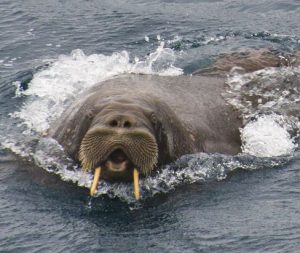 Blubbery, clam-loving Pacific walruses are surprisingly resilient to the dramatic loss of polar sea ice as the planet warms and won’t be listed as an endangered species, the federal government announced early Wednesday. The decision is controversial. A scientist for a group that works to protect endangered animals called it a Trump administration “death sentence for the walrus.” But Alaska Gov. Bill Walker, the state’s all-Republican congressional delegation, Native hunters, Arctic Slope Regional Corp. and the state Department of Fish and Game all said it was the right call. “This decision will allow for the continued responsible harvest of Pacific walrus for subsistence and traditional uses by Alaska Natives,” Sen. Lisa Murkowski said in a written statement. click here to read the story 21:11
Blubbery, clam-loving Pacific walruses are surprisingly resilient to the dramatic loss of polar sea ice as the planet warms and won’t be listed as an endangered species, the federal government announced early Wednesday. The decision is controversial. A scientist for a group that works to protect endangered animals called it a Trump administration “death sentence for the walrus.” But Alaska Gov. Bill Walker, the state’s all-Republican congressional delegation, Native hunters, Arctic Slope Regional Corp. and the state Department of Fish and Game all said it was the right call. “This decision will allow for the continued responsible harvest of Pacific walrus for subsistence and traditional uses by Alaska Natives,” Sen. Lisa Murkowski said in a written statement. click here to read the story 21:11
As eels grow in value, US government clamps down on poaching
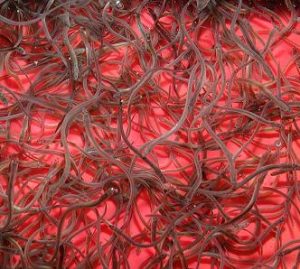 Law enforcement authorities have launched a crackdown on unlicensed eel fishermen and illicit sales along the East Coast.,, In Maine, more than 400 licensed fishermen make their living fishing for elvers in rivers such as the Penobscot in Brewer and the Passagassawakeag in Belfast every spring. They say law enforcement is vital to protecting the eels and the volatile industry. Randy Bushey, of Steuben, has been fishing for elvers since 1993. He said he saw his income balloon from as little as $5,000 per year in the 1990s to more than $350,000 in 2012. He said tighter quotas mean he’s earning less these days, and in the most recent season he made about $57,000. “I’ve seen the best, and I’ve seen the worst,” Steuben said. “I want to see it preserved. I want to see it straightened out.” click here to read the story 08:16
Law enforcement authorities have launched a crackdown on unlicensed eel fishermen and illicit sales along the East Coast.,, In Maine, more than 400 licensed fishermen make their living fishing for elvers in rivers such as the Penobscot in Brewer and the Passagassawakeag in Belfast every spring. They say law enforcement is vital to protecting the eels and the volatile industry. Randy Bushey, of Steuben, has been fishing for elvers since 1993. He said he saw his income balloon from as little as $5,000 per year in the 1990s to more than $350,000 in 2012. He said tighter quotas mean he’s earning less these days, and in the most recent season he made about $57,000. “I’ve seen the best, and I’ve seen the worst,” Steuben said. “I want to see it preserved. I want to see it straightened out.” click here to read the story 08:16

Feds interview Tangier watermen, look into oyster sales records in Crisfield
Officers from the U.S. Fish and Wildlife Service visited several watermen on Tangier Island and seafood businesses in Crisfield last week as part of an investigation they are conducting related to oysters. Federal officials would not confirm or deny the existence of an investigation, saying that’s their policy. But Wyn Hornbuckle, a spokesman for the U.S. Department of Justice, did confirm “federal law enforcement activity” in Crisfield and Tangier last Wednesday. Tangier Mayor James “Ooker” Eskridge said the officials came in two boats and a helicopter; at first, he said, he thought President Donald Trump had arrived. click here to read the story 12:05
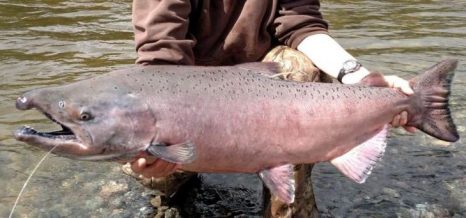
State of the kings
For the first time in years, king salmon are showing signs of making a stronger return to the vast wilderness surrounding Alaska’s urban heartland. While Panhandle runs continue to struggle, kings to the north appear to be coming back in reasonable numbers. No records are being broken, but there are enough fish the Alaska Department of Fish and Game has liberalized fishing in two of the state’s most popular roadside king salmon drainages – the Kenai River south of Anchorage and tributaries to the Copper River east of the state’s largest city. A near disaster had been forecast on the latter river, a big, muddy, glacial stream draining 26,500 square miles of Alaska near the Canadian border. A return of only 29,000 fish was expected, and with the spawning goal set at 24,000, the state imposed a host of restrictions on the fishery before it even began. Sport fishing was closed. Subsistence fishermen were restricted to a seasonal limit of only two Chinook, the more common Lower 48 name for kings. And commercial fishermen faced major reductions in fishing time and closures of areas that have in the past produced the biggest king catches. click here to read the story 09:37
Interior secretary set to visit Boston as enviros launch marine monument campaign
 When Interior Secretary Ryan Zinke visits the Boston area on Friday, environmentalists plan to greet him by rallying for the preservation of national monuments that are under review by the Trump administration. The former Montana congressman has an 11 a.m. press event at a Legal Sea Foods location, according to his office. The Bay State visit could also afford the interior secretary a chance to meet with the state’s top Republican, Gov. Charlie Baker, although nothing has been announced. The fishing industry opposed President Barack Obama’s 2016 designation of the Northeast Canyons and Seamounts Marine National Monument on a roughly 4,900 square-mile area south of Cape Cod. According to a Zinke press aide, the secretary on Friday will meet with a U.S. Fish and Wildlife Service officials and officials from the New England Aquarium about marine wildlife around the monument. The secretary will then attend a roundtable meeting with lobstermen and fishermen about the impact of the monument designation on their industry. click here to read the story 18:36
When Interior Secretary Ryan Zinke visits the Boston area on Friday, environmentalists plan to greet him by rallying for the preservation of national monuments that are under review by the Trump administration. The former Montana congressman has an 11 a.m. press event at a Legal Sea Foods location, according to his office. The Bay State visit could also afford the interior secretary a chance to meet with the state’s top Republican, Gov. Charlie Baker, although nothing has been announced. The fishing industry opposed President Barack Obama’s 2016 designation of the Northeast Canyons and Seamounts Marine National Monument on a roughly 4,900 square-mile area south of Cape Cod. According to a Zinke press aide, the secretary on Friday will meet with a U.S. Fish and Wildlife Service officials and officials from the New England Aquarium about marine wildlife around the monument. The secretary will then attend a roundtable meeting with lobstermen and fishermen about the impact of the monument designation on their industry. click here to read the story 18:36
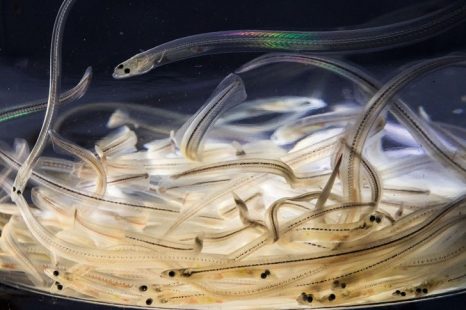
Inside the Multi-million-Dollar World of Eel Trafficking
The alleged kingpin of one of the biggest domestic wildlife smuggling operations ever to hit the East Coast is exactly where you’d expect to find him on a rainy evening in early May: firmly planted in a swivel chair at a big green metal desk inside his renovated Quonset hut on Foster Street, in Ellsworth, Maine. At this post Bill Sheldon waits day and night for fishermen to come and fill his bowl with writhing masses of baby eels. The 72-year-old fisherman wears glasses, a blue flannel shirt, jeans, duck boots, and a brown L.L. Bean baseball cap. His cell phone goes quack, quack, quack when it rings. The sign above his head reads, “Buying Glass Eels Here,” with the day’s market price: $1,250 per pound. (so much more about the fishery in this article than “trafficking”) click here to read the story 09:26
Red tide clears off Collier County, but stone crab catch still down
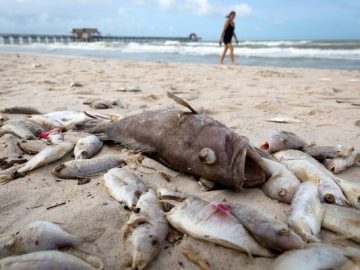 The red tide lingering on Florida’s Gulf coast last fall and this winter has cleared up in Collier County. Fish kills were reported in December in Collier, but the algae blooms that bring thousands of dead fish to shore and cause beachgoers to cough and sneeze have, for the most part, stayed north in Pinellas and Sarasota counties, according to a report Friday from the U.S. Fish and Wildlife Service. Clearer water would be good news for the price of stone crabs and for local stone crab fisherman, who were hammered early this season by a red tide that followed Hurricane Matthew in October. The fewer crabs caught, the higher the market price for Southwest Florida’s most popular seafood. Catch totals are still down in Goodland compared with typical years, said Damas Kirk, of Kirk Fish Co. “Red tide isn’t showing so much anymore, but I think it’s done some damage,” Kirk said. “I think the stone crabs are having a bit of a food supply issue and are starving somewhat.” Read the story here 15:50
The red tide lingering on Florida’s Gulf coast last fall and this winter has cleared up in Collier County. Fish kills were reported in December in Collier, but the algae blooms that bring thousands of dead fish to shore and cause beachgoers to cough and sneeze have, for the most part, stayed north in Pinellas and Sarasota counties, according to a report Friday from the U.S. Fish and Wildlife Service. Clearer water would be good news for the price of stone crabs and for local stone crab fisherman, who were hammered early this season by a red tide that followed Hurricane Matthew in October. The fewer crabs caught, the higher the market price for Southwest Florida’s most popular seafood. Catch totals are still down in Goodland compared with typical years, said Damas Kirk, of Kirk Fish Co. “Red tide isn’t showing so much anymore, but I think it’s done some damage,” Kirk said. “I think the stone crabs are having a bit of a food supply issue and are starving somewhat.” Read the story here 15:50
“Operation Broken Glass” – Three Men Plead Guilty for Illegally Harvesting and Selling American Eels
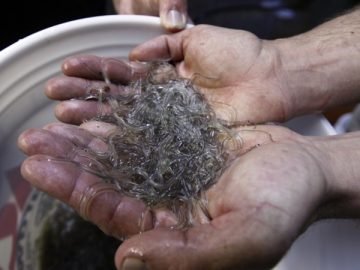 Three individuals pleaded guilty in federal district court in Charleston, South Carolina, to trafficking more than $740,000 worth of juvenile American eels aka “elvers” or “glass eels,” in violation of the Lacey Act. Harry Wertan, Jr., Mark Weihe and Jay James each pleaded guilty to selling or transporting elvers in interstate commerce, which they had harvested illegally, or knew had been harvested illegally, in South Carolina. The pleas were the result of “Operation Broken Glass,” a multi-jurisdiction U.S. Fish and Wildlife Service (USFWS) investigation into the illegal trafficking of American eels. To date, the investigation has resulted in guilty pleas for ten individuals whose combined conduct resulted in the illegal trafficking of more than $2.6 million worth of elvers. Operation Broken Glass was conducted by the USFWS and the Justice Department’s Environmental Crimes Section in collaboration with 17 state and federal agency’s. Read the rest here 08:28
Three individuals pleaded guilty in federal district court in Charleston, South Carolina, to trafficking more than $740,000 worth of juvenile American eels aka “elvers” or “glass eels,” in violation of the Lacey Act. Harry Wertan, Jr., Mark Weihe and Jay James each pleaded guilty to selling or transporting elvers in interstate commerce, which they had harvested illegally, or knew had been harvested illegally, in South Carolina. The pleas were the result of “Operation Broken Glass,” a multi-jurisdiction U.S. Fish and Wildlife Service (USFWS) investigation into the illegal trafficking of American eels. To date, the investigation has resulted in guilty pleas for ten individuals whose combined conduct resulted in the illegal trafficking of more than $2.6 million worth of elvers. Operation Broken Glass was conducted by the USFWS and the Justice Department’s Environmental Crimes Section in collaboration with 17 state and federal agency’s. Read the rest here 08:28






